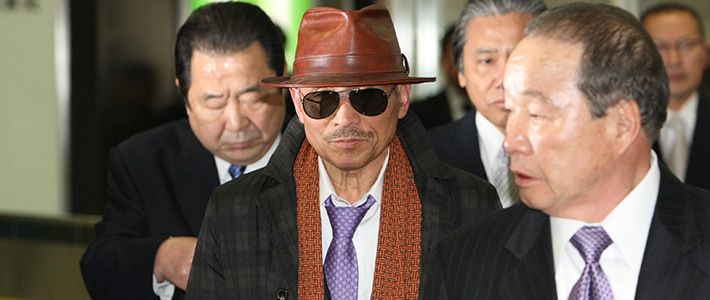The task for sociology is to come to the help of the individual. We have to be in service of freedom. It is something we have lost sight of.
Deviance and Social Control
(Part C)
Bye
Charles Lamson
Deviance and Changing Values
One of the factors that make it especially difficult to gather and interpret statistics on crime is that definitions of crime and deviance are constantly changing as the society's values change.
 |
| IMAGE 1 Negative Sanction
In any society, agreement on particular aspects of crime and deviance can range from weak (in cases in which there is much controversy) to strong (in cases in which there is little disagreement). Negative sanctions (see Image 1), or punishments, can also range from very weak to very strong. Capital punishment is the strongest sanction in the United States, followed by life imprisonment. Minor fines or the suggestion that a person undergo treatment for a behavior that is viewed as deviant are relatively weak sanctions. Nor are all sanctions formal punishments meted out according to law. Some deviance can be punished by means of shunning or the "silent treatment," and milder infractions can be controlled by simply poking fun at the person in an attempt to change his or her behavior.
In the eyes of the law driving while intoxicated (DWI) is classified as a deviant behavior, but only in the last four decades have DWI laws been enforced systemically. Why? We all fear the drunk driver and agree that driving while intoxicated is dangerous, but because so many people are social drinkers this norm is frequently violated. Consequently, we have placed relatively mild sanctions on DWI except when the outcome is a fatal accident. In recent decades, however, organized groups opposed to drunk driving have helped change public attitudes, and the sanctions against DWI has become stronger. In a study of this issue, Joseph Gusfield (1981) found that the highway death rate had steadily decreased after 1945, but that the public's perception of the relationship between highway deaths and drunk driving had sharpened as a result of media outrage and lobbying by citizens groups (The Culture of Public Problems: Drinking and the Symbolic Order. Chicago: University of Chicago Press).
Our perception of homosexuality is another example of significant change in Americans' attitudes toward a deviant behavior and the strength of the sanctions invoked. A century ago homosexuality was widely regarded as a serious form of deviance. Homosexuals were persecuted whenever they were exposed. Today they are widely celebrated on national TV for their bravery (as shown below in Image 2).

IMAGE 2 Homosexuals
Homosexuality continues to be viewed as deviant by most nonhomosexuals, but it is tolerated to the extent that gay men and women are able to create their own communities and openly fight against such sanctions as discrimination in the labor market. Homosexuals have had some success in gaining passage of laws that would grant same-sex couples the legal standing of de-facto married couples. The decision by the Walt Disney Company to extend the health and other insurance benefits to same-sex domestic partners of employees is a highly visible example of the increasing legitimacy of homosexual households, although the company has come under intense fire from groups that oppose homosexuality on religious grounds.
Deviant Subcultures
Even when the majority of the population can be said to support a particular set of values, it will contain many subcultures whose lifestyles are labeled deviant by the larger population (Rubington & Weinberg, 1996, Deviance: The Interactionist Perspective, 6th ed.). Deviant subculture includes a system of values, attitudes, behaviors, and lifestyle that are opposed to the dominant culture of the society in which it is found (Brake, 1980, The Sociology of Youth Cultures and Youth Subcultures. London: Routledge and Kegan Paul). The members of the subculture are also members of the larger society; they have families and friends outside the subculture with whom they share many values and norms. Within the subculture, however, they pursue values that are opposed to those all the larger or "mainstream" culture. Subcultures evolve their own rather insulated social world for community with local myths ("X is a slick dealer who once beat the tables in Vegas and was asked to leave the casino"), ways of measuring people's reputations ("he's a punk," "he's cool"), rituals and social routines, particular language or slang, formal and informal uniforms (e.g., the attire worn by bikers), and symbols of belonging such as tattoos (Simmons, 1985, The Nature of Deviant Subcultures. In E. Rubington & M. S. Weinberg (Eds.), Deviance: The Interactionist Perspective).
IMAGE 3 Addicts, San Francisco, 2017 (https://time.com/james-nachtwey-opioid-addiction-america/)
Just use Google or any Internet search engine to look up street names for drugs and you will see how subcultures of drug users (see Image 3) and dealers provide many illustrations of all the ways in which people who engage in deviant activities often develop their own vocabulary and norms.
Professional criminals---including major drug dealers, bookmakers and gamblers, hired killers, and loan sharks---who think of their illegal activities as occupations, often become part of secret crime organizations. the best known (but hardly the only one) is the Mafia. Originally a Sicilian crime organization, the mafia spread to the United States via Sicilian immigration in the late 19th century. In recent years some successful crusades have been waged against the Mafia (Ianni, 1998, New Mafia: Black, Hispanic, and Italian Styles. Society, 35, 115-129).
 IMAGE 4 Yakuza Gangs Face Fight for Survival as Japan Cracks Down on Organized Crime
The subculture of organized crime is not unique to North America. However, In Japan, even the Yakuza, as the crime gangs are called (who trace their origins back to the mid-Edo period (1603-1868))(https://en.wikipedia.org/wiki/Yakuza))), fight for survival as Japan cracks down on organized crime. And even though the Yakuza are in their twilight, they still control many illegal businesses, just as they do in other countries, and they often resort to violence to discipline their members. As in the United States, organized crime in Japan is most directly associated with behaviors that are considered deviant, such as prostitution, gambling and drug use, and a distinct subculture has emerged among those who engage in such behavior.
North Korea's Illicit Activities The alleged illicit activities of the North Korean state include manufacture and sale of illegal drugs, the manufacture and sale of counterfeit consumer goods, human trafficking, arms trafficking, wildlife trafficking, counterfeiting currency (especially the United States dollar and Chinese yuan), terrorism, and other areas. It is alleged many of these activities are undertaken at the direction and under the control of, the North Korean government and the ruling Workers' Party of Korea, with their proceeds going towards advancing the country's nuclear and conventional arms production, funding the lifestyles of the country's elite, and propping up the North Korean economy (https://en.wikipedia.org/wiki/North_Korea%27s_illicit_activities).In sum, many deviant subcultures flourish because they provide opportunities to engage in behavior that is pleasurable to some people but is considered deviant in "respectable" (conventional) society. Clearly, therefore, the line between what is normal and what is deviant is not nearly as distinct as one might believe from official descriptions of the norms of good conduct. However, one must recognize that membership in a deviant subculture, especially for those without money and power, often leads to exploitation and early death. In view of these problematic aspects of deviant subcultures, sociological and other explanations of deviant behavior take on special importance.
*MAIN SOURCE: SOCIOLOGY IN A CHANGING WORLD, 6TH ED., WILLIAM KORNBLUM, PP. 185-190*
end
|

No comments:
Post a Comment